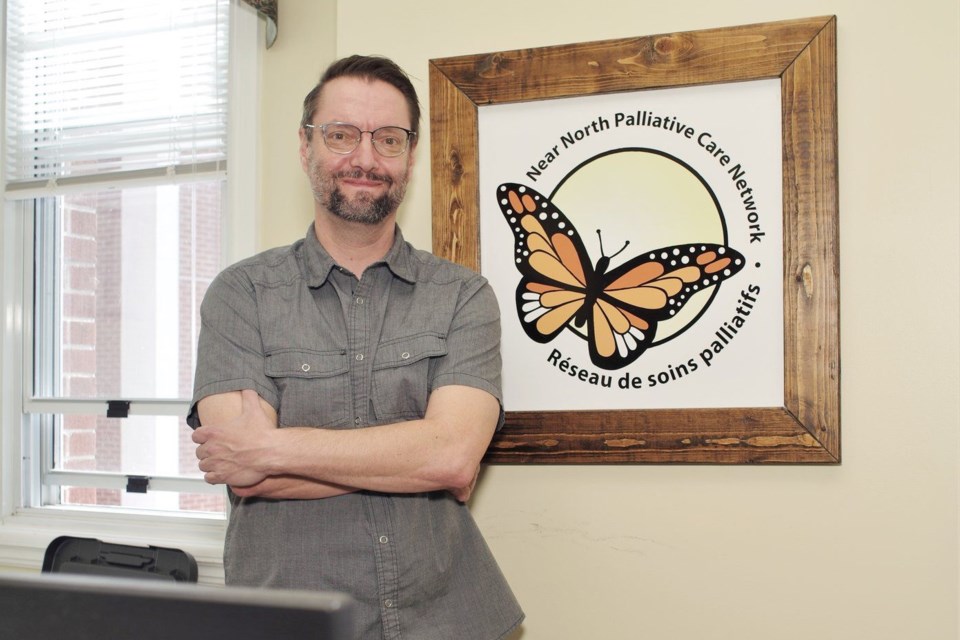The Near North Palliative Care Network (NNPCN) says Ontario faces a hospice and palliative care beds crisis that will only get worse if nothing is done to face this growing problem.
NNPCN has embarked on a public awareness and volunteer recruitment drive in the Nipissing District and Parry Sound District as its Hospice Care Coordinator, Scott Gardiner visits area town councils explaining what the agency does and the need for volunteers.
During the meetings, Gardiner explains the services NNPCN offers.
They include palliative care support, grief and bereavement support, caregiver respite, and its adult day program for seniors which includes yoga, art workshops, and a new music therapy program.
So far, he has addressed town councils in South River, Powassan, Strong Township, North Bay, Callander, Mattawa, and East Ferris. Still to come are appearances in Joly, Sundridge, West Nipissing, and Bonfield.
One highlight of Gardiner's presentations is that in less than two decades Ontario seniors will face a major hospice and palliative care beds shortage.
Gardiner says by 2046 one in five Ontarians will be over 85 years old which translates to several million people.
Some of those people will need special care but using today's number of 491 hospice beds in the province plus 4,000 palliative care beds, Gardiner says it's clear “the number of beds we have is not anywhere near enough”.
Gardiner is telling the town councils one way to offset the bed shortage is to allow more people to stay in their own homes as they age, and this is doable if NNPCN can attract more volunteers.
“Our goal is to provide training and resources free of charge to as many people in our catchment area as possible,” Gardiner told South River council. “This would ensure we have people throughout our communities who have the knowledge required to assist their neighbours, families, and friends as the need arises. And it allows the person in need to stay in their home as long as possible.”
Gardiner says the more people can remain in their own homes as they age, the less strain there is on existing hospice and palliative care beds in addition to reducing the stress on a healthcare system “that's already stretched to the limit”.
Gardiner says volunteers would not be required to do a lot of work saying it “could be something as simple as preparing a meal or running errands.” Gardiner adds it's having those volunteers in place that lets NNPCN offer the services it does to seniors free of charge.
Gardiner says having more volunteers will also help the primary caregiver look after a family member. He says some primary caregivers experience a tremendous amount of stress while caring for a loved one “which can lead to caregiver burnout”. Gardiner says in some instances this burnout could affect the caregiver's physical and mental health which may require hospitalization.
Gardiner says the NNPCN is looking to community leaders to help spread the word on its objectives. He adds people don't even have to become volunteers in the organization.
“We just want them to take the training so we can prepare as many people as possible to be able to help others,” he said. “And if they do become volunteers, that's fabulous. Our current volunteers are getting older and it's becoming a struggle for us to find enough volunteers to send out into the communities.”
Gardiner says the NNPCN training takes place online.
In the case of South River, it intends to put the work that the NNPCN does and its quest for volunteers in its monthly newsletter to its residents.
Since beginning the awareness campaign, Gardiner told South River council the organization has attracted at least six new volunteers.
Residents in the Districts of Nipissing or Parry Sound who are interested in the NNPCN training can email the organization at [email protected] or call the agency at 1-800-287-9441.
Rocco Frangione is a Local Journalism Initiative reporter who works out of the North Bay Nugget. The Local Journalism Initiative is funded by the Government of Canada.



